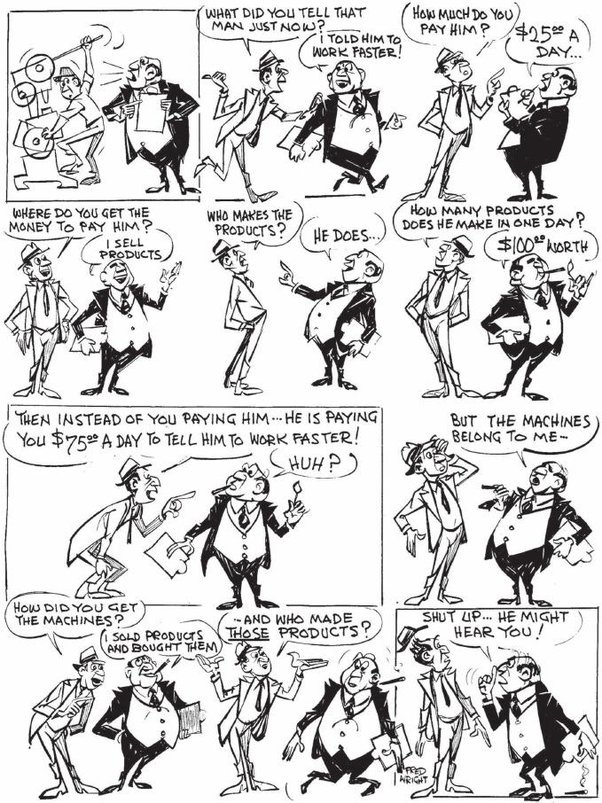Yes, the System Is the Problem, Not Just Individuals
Capitalists frequently claim that the system they benefit from only has flaws because “bad capitalists” do bad things, and “good capitalists” do good things. This is idealistic.
The capitalist system itself is the problem. It causes everything that these idealists blame on “bad people”. We have described how capitalism works here and here. Basically, the capitalist class controls the means of production, so workers must sell their labor-power to survive. What is special about labor-power is that unlike other commodities, using labor-power (doing work) creates new goods which, when put up for sale, have more value than the labor-power, materials, and means of production used. In an oversimplification, we can say that “labor creates value.” Now, since capitalists own workers’ labor-power, they get the extra value that workers’ labor “produces”. This extra value, called surplus value, is where most profit comes from. This comic summarizes what we say quite well:
People try to defend capitalists by saying that “good capitalists” do not exploit labor, but the fact is that all capitalists must exploit workers, even if they don’t want to. Capitalists must do what it takes to keep their profits high. Robert Albritton explained in Economics Transformed: Discovering the Brilliance of Marx how the capitalist system often forces capitalists to be ruthless to survive:
Marx refers to capitalists and workers as personifications of economic categories. It is not that they have no agency at all, but rather that in the theory of capital’s deep structure their agency is sharply constrained by the motion of economic categories operating through a commodity form. A particular English capitalist in 1830 may not particularly like exploiting the labor of children, but because their labor is cheap and docile, he may be unable to afford not to if it means losing out to competitors. In short, in order to be a capitalist at all, he must make profits, and if exploiting children is a necessary part of this, then his choice is to exploit children or go out of business. Indeed, as Marx points out in Capital, it is precisely such reification that made it so difficult to end the exploitation of children in England. And it is such reification that always leads to the “hard choices” that always place profits ahead of other human values. “Sorry we had to shut down the only company in the company town thus destroying the town, but it was no longer profitable.” “Sorry we had to pollute the environment, but not to have done so would have increased costs too much.” A great deal of the history of capitalism is people mobilizing to deal with such fallout, fallout that stems from the indifference to use-value (everything qualitative including human beings) that results from subsuming economic life to the commodity form. [Source]
Even the most moral capitalist, if they wanted to stay in their capitalist class, is forced to exploit labor. Capitalists who use cheaper sources of energy for production have higher rates of profit than those who use more-expensive, albeit cleaner sources of energy, hence why industrial production and distribution account for the majority of carbon emissions. In an economic crisis, capitalists are forced to destroy excess products and means of production to ensure a higher rate of profit for themselves.
Capitalism’s laws are problematic, even if the individuals who benefit from them are “morally good”. Therefore, we cannot replace “bad” capitalists with “good” ones; we must overthrow the capitalist class, establish the dictatorship of the proletariat (which is socialism), and make the necessary economic transitions to communism. Only with the victory of communism can the systemic flaws of capitalism be corrected.




